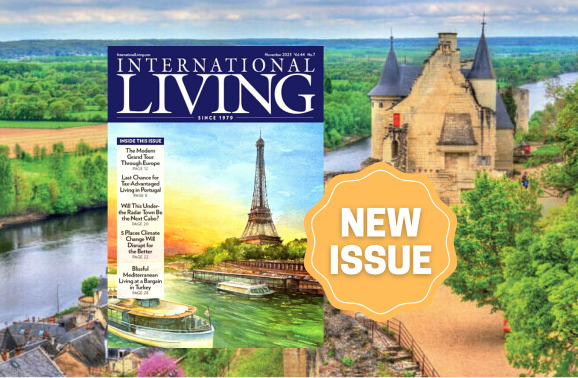Most people dream of being a travel writer—imagine getting paid to travel the world. Travel writing can become a full-time passion if you like, or merely something you do on the side…a way to justify a vacation and defray some of the costs, maybe write off your trip on your taxes.
With this career, you’ll have plenty of opportunities to get out and see the world…in a way you never could as an ordinary tourist.
Join our Fund Your Life Overseas e-letter today, and you’ll hear from us five times a week, telling you about ways to earn income that lets you live anywhere, travel anytime… and give you the funds to make your overseas dream real.
Benefits of being a Travel Writer
How would you like a trip to Cancun, at no charge, where you and your spouse would be wined and dined over a long weekend at a new, luxury hotel?
Or maybe you’d be more enticed by a complimentary rafting expedition down the Amazon in Ecuador’s untamed rain forest?
Perhaps a no-charge cruise to Europe’s most romantic cities?
Those trips might sounds like daydreams, but they are all money-free travel perks freelance writers have taken advantage of.
And not only did those writers travel without paying a dime, they got paid to write about their experiences, too.
If you’ve ever dreamed about living the romantic life of a travel writer, you don’t need to wait years to enjoy it.
See the articles below for more information on the travel writer’s life.
Travel Writing Tips
Keep it Simple
Plain language is easily understood and paints a clearer picture than confusing jargon and purple prose. Ask yourself what you want to say and then say it.
Be Specific
Specific information is more useful and interesting for the reader. Every travel writer has written about Paris, but have they hunted ghosts in Père Lachaise, or found the best bowl of Phở in the Quartier Asiatique? Focusing on an idea will keep your writing fresh and catch people’s attention.
The Lead
Your first sentence is the most important sentence. The reader will stop reading your story if they don’t like the lead. Draw the reader in with humor, an interesting fact, or novel idea, and avoid summarising your story. Revealing the information throughout the piece will keep your reader’s attention until the end.
The Headline
Say what your piece is about in five-to-eight words. If you’ve focused you’re story on a specific idea the premise alone should grab the reader’s attention. When making list type articles, odd numbers make for a stronger headline.
What’s Different?
Describe the features that make a destination special. Readers love new information and it’s the differences that form the details of the picture in their head.
For example, there are “sandy beaches” all over the world…but in Coronado, Panama, the beaches are “swirling stretches of black-and-white sand that sparkle in the morning sun.”
Short is Good
Keeping an article short can mean the difference between a punchy, informative story and an exhausting, dull rant. Removing unnecessary information will leave you with best possible version of your story (and often a much shorter one).

Get Your Free Report on the World’s Best Places to Retire:
Learn more about the best places in the world to retire in our daily postcard e-letter.
Simply enter your email address below to sign up for our free daily postcards and we’ll also send you a FREE report on The World’s Top 10 Retirement Havens, plus access to over 10 more free reports. Our gift to you, on our favorite destinations.
How to Become a Travel Writer
Uniquely, for travel writers, inexperience can sometimes be an asset. In an industry that is constantly searching for fresh new perspective, the unseasoned writer can bring just as much to the table as the established pro. The travel writer’s biggest hurdle isn’t having the right qualifications; it’s getting their work in front of the eyes of the right people.
For that you need the right strategy.
Find your Niche
When you’re getting started as a travel writer, one of the most challenging things is trying to stand out from the crowd. The market can be competitive, so focusing your attention is a crucial first step. Taking a scattershot approach might graze a few targets but it’s not likely to hit any bull’s-eye. You need to narrow your writing down to a topic that you can truly excel at.
For instance, if you’re a culinary whiz, you could be well-suited to writing about the food culture of your destination of choice. Or, if you’re a history buff, you might find a proclivity for writing about historical destinations, like Florence or Beijing. Likewise, if you’re a retiree, you can focus your writing on a retiree readership and the particular travel interests they have. Having a niche is a great way to distinguish yourself as a travel writer. And publications that cater to that niche will be far more likely to accept your submissions if you can demonstrate your knowledge and interest in your writing.
Just remember that if there’s an aspect of travel that you’re interested in, then there’s probably a whole community of people with the same interest, as well as a plethora of publications that cater to them.
Get Your Travel Writing Published
To make money as a travel writer you must be able to sell your articles. And there are thousands of magazines all over the world that will take them—both in print and online. Finding these publications takes some research starting out, but it pays off big dividends down the road. Thankfully, the internet has made this process so much easier for writers.
“I started out by simply searching on Google,” says Noreen Kompanik, who has been a travel writer since 2014 and still finds it hard to believe that it’s really her job.
“For example if you search ‘travel magazines that pay freelance writers’ or something more specific, like ‘food magazines that pay writers,’ you’ll find tons of resources. I can guarantee someone out there has already compiled a list. Writer’s Market is another great publication that can be purchased in hardcover or an online version. This nifty resource—the world’s largest compilation of freelance sites—is well worth the investment. And there’s always a bookstore. I’ve been known to frequent my neighborhood Barnes and Noble, buy a cup of coffee, and peruse the magazine section. I’ve found a multitude of publications out there I never even knew existed.”
Once you’ve researched a publication and read back articles so you’re familiar with the sort of content they publish, check the website for writer’s guidelines—most publications have them posted. These are instructions from the editors to freelance writers.
The next step is to begin writing. This could be a completed article or a short query pitching your idea to the editor, depending on the preference of the publication. There are hundreds of magazines out there that pay freelancers, so, taking the time to find the ones that match the type of content you want to write is key.
Publications tend to pay anywhere from a few cents to $1 a word. Travel writers agree writing articles is not a fast track to riches, but—when you consider the value of the free travel you have access to—it can prove an excellent means to cover the cost of travel and provide access to a quality of travel that would otherwise be beyond your budget.
Claim Free Travel Perks
One of the best benefits of being a travel writer is the freebies you get along the way. Hotels, restaurants, and even tourist attractions are more than willing to play host to travel writers in exchange for a published story. As a matter of fact, they love doing it. It’s a lot cheaper for them than advertising, and they know it.
For Noreen, lining up freebies for a writing trip is just matter of course. “Once a writer has a letter of assignment or verbal agreement that a publication is interested, it’s easy to get some individual tourist businesses willing to host you for free. When I’m going on a trip I contacted individual businesses such as hotels, B&Bs, restaurants, and museums letting them know I will be on a travel writing assignment and asking them if they’d be interested in hosting me in exchange for a travel article that either features the establishment or includes them in the article.”
The more a writer puts himself or herself out there, the greater the chance of landing some complimentary travel. “Travel shows are a great way to talk directly with travel reps, and they’re a help all over the world,” says Noreen. “Writers can ask to be placed on their mailing list for future press trips and introduce themselves, letting the rep know they’re interested in visiting their location.
“I’ve been able to stay in luxury vacation rentals overlooking Mexico’s Sea of Cortez this way. Five-star restaurants in a variety of places have provided complimentary dinners, including wine pairing. I’ve taken city tours, harbor tours, winery tours, ghost tours, ziplining, sunset cruises, and snorkeling trips. I’ve had spa treatments and massages, ridden on horseback through the vineyards, kayaked beautiful rivers and lagoons, and greeted the sunrise in a hot-air balloon. Despite my fear of heights, it was awesome.”
8 Places to Find Publications for Your Travel Articles

Here are some great resources to use when you’re looking for a publication to submit your travel article to:
Writer’s Market—This annual publication lists 9,000 or more (mostly North American) publications that buy articles, travel and others. This resource is a must. You can order it online and have a copy sent to you. Or you subscribe to the online edition, which offers a searchable database.
www.citymag.org—This website, maintained by the City and Regional Magazine Association, lists its member publications.
www.onlinenewspapers.com—This website will connect you to thousands of newspapers around the world. (English-language papers outside of the U.S. might be interested in stories about your hometown.)
www.writerswrite.com/guidelines/—If you search this site for guidelines with the keyword “travel,” lots of potential markets for your story will pop up, both paying and non-paying, online and print.
www.google.com—Search for “writer’s guidelines travel publications” and you’ll be rewarded with all sorts of potential markets for your articles.
www.travelthruhistory.com—This is a great resource if you are looking to write about historical, archaeological, and cultural aspects of a destination. They also accept stories about literary journeys, visits to the haunts of famous writers and artists, unique museums and art galleries.
www.gonomad.com—GoNOMAD is a robust, searchable database of thousands of tours and unique trips to exotic destinations around the world and around the U.S. It’s a specialized marketplace for travel books, music, films, goods and gear.
http://botw.org/top/Recreation/Travel/Publications/Magazines/—Best of the Web hosts a long list of travel publications with audiences around the world. This list includes both online and print publications. Many are niche online magazines and don’t appear on other lists.

Get Your Free Report on the World’s Best Places to Retire:
Learn more about the best places in the world to retire in our daily postcard e-letter.
Simply enter your email address below to sign up for our free daily postcards and we’ll also send you a FREE report on The World’s Top 10 Retirement Havens, plus access to over 10 more free reports. Our gift to you, on our favorite destinations.





